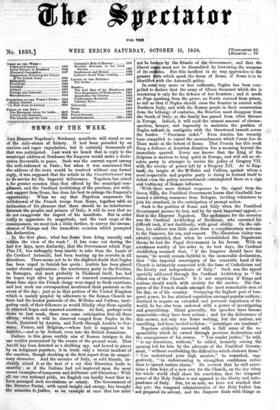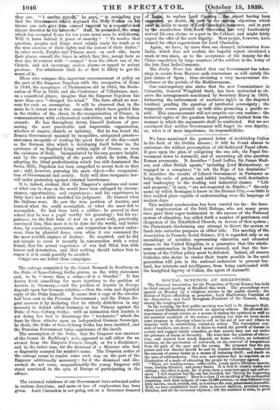.NEWB - OF THE WEEL
THE Emperor Napoleon's Bordeaux manifesto stand as one of the mile-stones of history. It had been preceded by an anxious and eager expectation, but it certainly transcends all that was anticipated. Last week we heard that in reply to the municipal address at Bordeaux the Emperor would make a decla- ration favourable to peace. Such was the current report among the well-informed in Paris ; but when it was announced that use address of the town would be received without any formal _reply, it was supposed that the article in the Constitutionnel was to do service for the Imperial deliverance. Napoleon has seized -a far greater occasion than that offered by the municipal com- pliment, and the Cardinal Archbishop of the province, not with- ,out support from Rome, has done his best to enlarge the Emperor's opportunity. When we say that Napoleon announces 'the _withdrawal of the French troops from Rome, together with an intimation of his pleasure that there should be no interference between the peoples and princes of Italy, it will be seen that we do not exaggerate the import of his manifesto. But in order really to appreciate its magnitude, and the vast scope of the -consequences, we must look a little further, to survey the circum- stances of Europe and the immediate occasion which prompted his declaration.
In the first place, what has Rome been doing recently and. _within the view of the week'? It has come out during the ' .last few days, more distinctly, that the Government which Pope Pius IX. has unhappily been unable to take from the hands of the Cardinal Antonelli, had been beating up for ,recruits in all directions. There seems not to be the slightest doubt that Naples has been urged to furnish her quota; Austria has been placed under chronic applications ; the reactionary party in the Duchies, in Romagna, and most probably in Piedmont itself, has had its hopes kept alive by promises of renewed communications. Some time since the French clergy were urged to fresh. exertions, and last week our correspondent mentioned their pastorals as the event of the day; just as in that portion of the United Kingdom which is mainly peopled by adherents to the Roman Church we have had the heated pastorals of the Ifiglales and Callens, insti- gating such of their followers as would blindly obey them equally to renewed hopes and renewed exertions. At first, perhaps even down to last week, there was some anticipation that all these efforts, which it will be observed ranged from Naples in the _South, Eastward by Austria, and North through Austria to Ger- many, France, and Belgium,—whose heir is supposed to be • faithful,—and. so by Ireland, even into the British dominions. - Failure in this gross earthly aim of Roman intrigue is the one verdict pronounced by the events of the present week. That "Anviti has been detected as a skulking spy, and hewed to pieces
• -by an indignant populace, is in truth only a trivial, incident of the reaction, though shocking at the first aspect from its sangui- nary character. And the enemies of Italy, or cold friends, in- stantly seized it as the text of a cry that liberation leads to anarchy ; as if the Italians had not improved upon the most recent examples of-temperate and deliberate self-liberation ! With all our own national pride, we English can hardly boast that we have managed such revolutions so calmly. The Government of - the Dictator Farini, with equal insight and energy, has brought the assassins to justice, as an example at once that law must not be zr by the friends of the Government, and that the liberal must not be discredited by borrowing the weapons
of its en ies. But this incident in no way approaches to the gritatra *Its which speak the doom of Rome, if Rome is to be identified with the Antonelli policy.
In some way more or less authentic, Naples has been com- pelled to declare that the army of fifteen thousand which she is mustering -is only for the defence of her frontiers ; and it needs no Pepe speaking from the grave, no Poerio rescued from prison, to tell us that if Naples should cross the frontier in contest with Northern Italy, and with the Roman people in their resurrection from the lethargy of centuries the Bourbon must disappear from family South of Italy, as the fa:ily has passed from other thrones in Europe. Indeed, it will need the utmost amount of circum- spection temper, and ingenuity to maintain the position of Naples Unhurt, in contiguity with the threatened tumult across the border. " Proximus ardet." Even Austria has recently been compelled to cancel the encroachments which Count Leo de Thun made at the behest of Rome. That Prussia has this week flung a defiance at Austrian dictation has a meaning beyond the immediate quarrel. Every one knows that the King of the Belgians is anxious to keep quiet in Europe, and will aid no ob- Wets party in attempts to revive the policy of Gregory VII. with the wrecks of power left by a dregory. XII. As to Eng- lanc she laughs at the WHales and Callous, against whom a most respectable and popular party is rising in Ireland. itself to defeat even the paltry encroachment contemplated there as a sign and testimony of Roman influence.
- With these more distant responses to the signal from the Seven Hills, the Pontifical Government learns that Garibaldi has issued a stirring summons from Bologna, inviting volunteers to join his standard, in the anticipation of prompt action. Such is the position of Rome and Italy when the Pontifical .Government presses its last, and by fax most important appeal,— that to the Emperor Napoleon. The spokesman for the occasion was the Cardinal Archbishop_ of Bordeaux, who executed his difficult task, if not faultlessly, with great ability. On the sur- face, his address was little more than a complimentary welcome to the Emperor, his son, and consort. The illustrious visitor was 'adroitly reminded, that when he reestablished the Napoleonic throne he had the Papal Government in his favour. With an astuteness worthy of his order in its best days, the Cardinal Archbishop assumed. that, "if the Emperor should have the means," he would remain faithful to the memorable declaration, that "the imperial sovereignty of the venerable head of the Church is intimately connected with the fame of Catholicism and the liberty and independence of Italy." Such was the appeal specially addressed through the Cardinal Archbishop to "the eldest son of the Church." It is not surprising if Kings and nations should watch with anxiety for the answer. The Em- peror of the French stands amongst the most remarkable men of his day, or of his country. Occupying the highest post of tem- poral power, he has attained reputation amongst popular authors ; destined to acquire an extended and personal experience of the world, he has also been endowed with a power of investigating and generalizing. Silent generally, his speeches have become memorable—they have been actions ; and for the deliverance of this answer, not only was Rome waiting, but the nations, not unwilling, had been invited to listen ; " intentique ora tenebant.” Napoleon evidently answered with a full sense of the re- sponsibility which he owned through previous declarations and the consequences of his course. "You render justice," he said, "to my intentions without," he added, instantly seizing the opening left for him by the advocate of the Pontifical Govern- _
meat "without overlooking the difficulties which obstruct them." "You understand your high mission," he remarked, sug- gestively, "in endeavouring to strengthen confidenee rather than to spread useless alarm." He avowed that he still enter- tains a firm hope of a new [era for the Church, on the day when the whole world shall share his conviction that the temporal power of the Holy Father is not opposed to the liberty and inde- pendence of Italy. But, let us note,- we have not reached that day yet ; the temporal administration of the Holy Father has not prepared its advent, and the Emperor deals with things as
they are. "I confine myself," he says, "to reminding you that the Government avkich replaced the Holy Father on his throne can only give kin counsel inspired by a respectful and
sincere devotion 'to his -interests." And, he proceeded, the army which has occupied Rome for ten years must soon be withdrawn.
Will it leave behind it peace or anarchy ? " To resolve that question, peoples and kings must calmly study the truth as to the wise exercise of their rights and the extent of their duties."
In other words, Peoples and Princes must, on each side, know their places consult the times in which they live, accept facts as they are, be content with " counsel" from the eldest son of the Church, and not encourage useless alarms or appeal to ardent passions. For whichever shall do so first is likely to get the worst of it.
Those who compare this important announcement of policy on the part of the Emperor Napoleon with the occupation of Rome in 1849, the acceptance of Piedmontese aid in 1855, the Decla- ration of War in 1859, and the Conference of Villafranca, may, • en a superficial glance, imagine that the Emperor Napoleon has more than once "changed his mind." The facts afford no war- rant for such an assumption. It will be observed that in the main he is intent now on the same ideas which have guided him in the studies of the closet, in the reorganization of France in communications with ecclesiastical authorities, and in the Italian crusade. He has throughout shown himself desirous of pro- moting the next practicable and improvable organization, whether of empire, church, or industry. But he has found the Roman Government manned by incapables, antiquated priests— statesmen incapable of reading the great facts of the day—such as the German idea which is developing itself before us, the existence of an Rneland lying within sight of France, or even the existence of Italy. Incapacitated by his own greater insight, and by the responsibility of the power which he holds from adopting the blind predestination which has still dominated the Seven Hills, Napoleon has been compelled to accept facts as they are ; still, however, pursuing his main object—the reorganiza- tion of Government and society. Italy will thus reorganize her- self under protection against external interference.
It is, indeed, evident that the Emperor's opinions and sense of what can be done in the world have been enlarged by circum- stances' opportunities, and experiences ; and his experiences in Italy have not a little modified his judgment. He learned what the Italians were. He saw the true position of Austria, and learned what she could accomplish, or what she must fail to accomplish. He had been bred a soldier; he proved in that school that he was a pupil worthy his genealogy; but his ex- perience, for the first time of war on a great scale, practically convinced him, that more is to be done for the world, and better done, by conviction, persuasion, and cooperation in moral endea- vour, than by physical force, even when it can command the the most terrible engines of destiny. He acquired, and he did not scruple to avow it recently in conversation with a royal friend, that his actual experience of war had filled him with horror and detestation, and that nothing should induce him to renew it if it could possibly be avoided.
Congresses are better than campaigns.



























 Previous page
Previous page